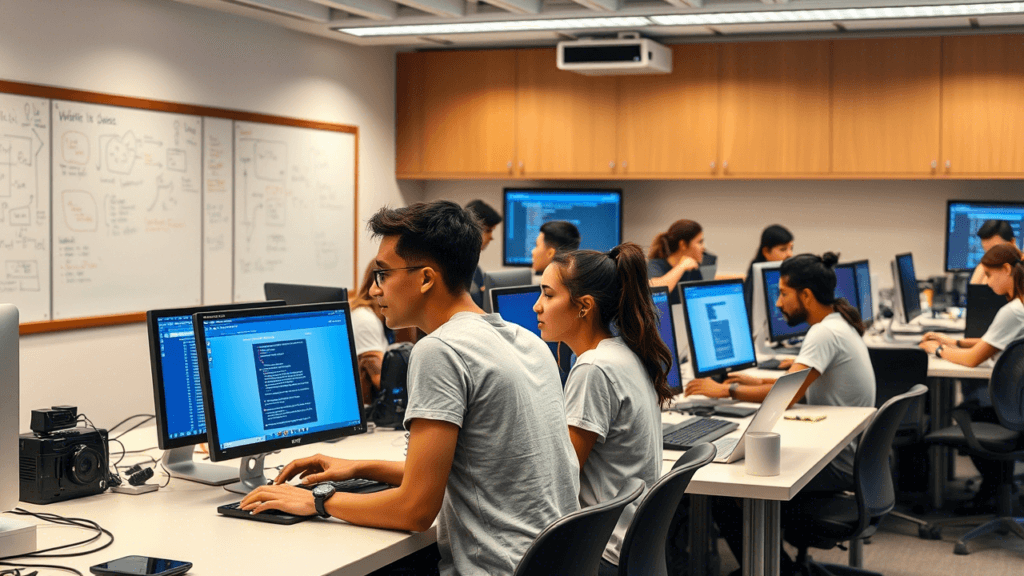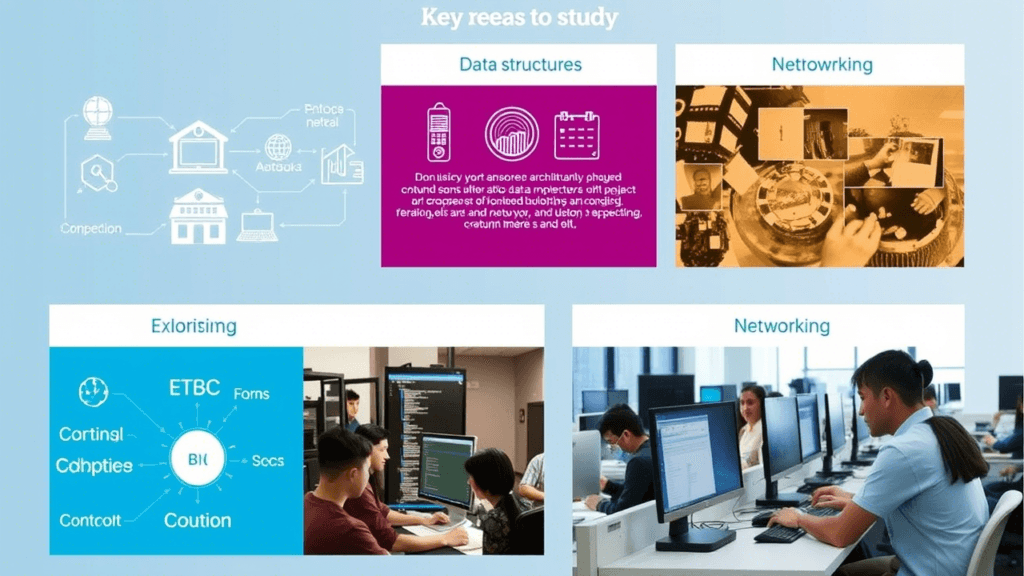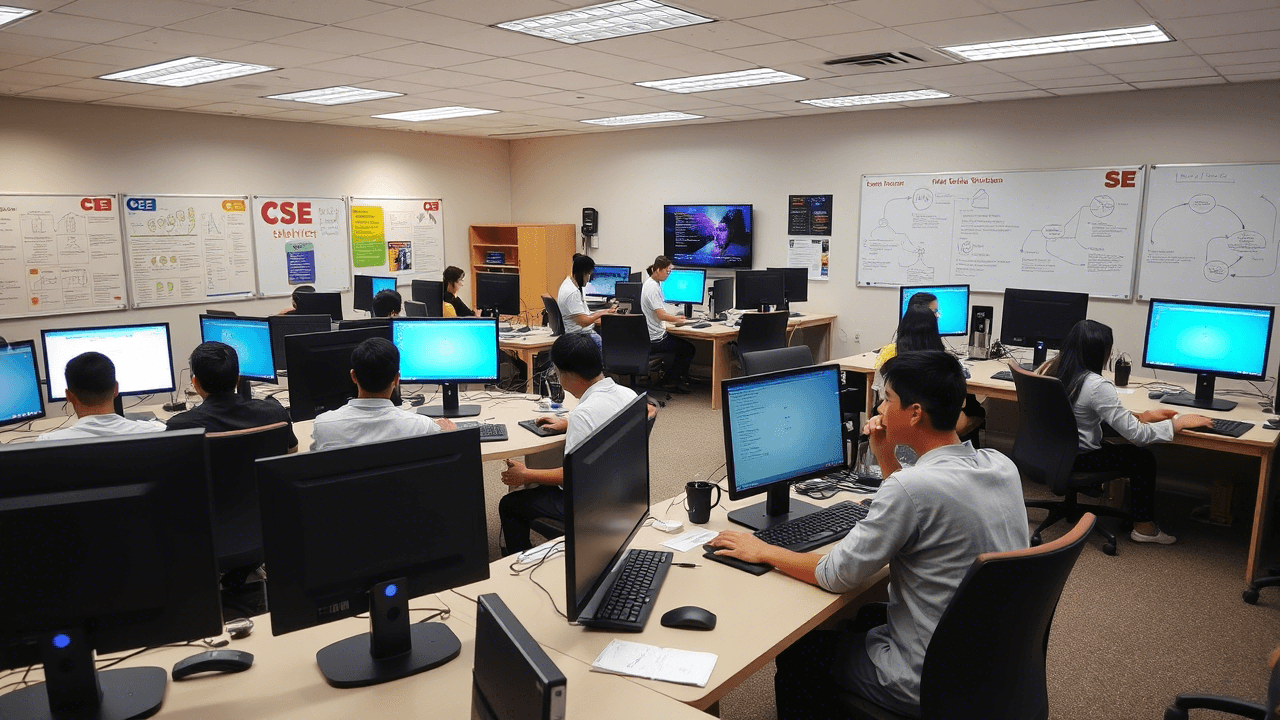Table of Contents
1. Introduction to B Tech CSE
B Tech CSE, or Bachelor of Technology in Computer Science and Engineering, is one of the most sought-after undergraduate programs in today’s tech-driven world. This course offers a blend of theoretical knowledge and practical expertise in computer science, programming, and engineering principles. Students who enroll in b tech cse not only gain a solid foundation in computing but also get an opportunity to engage with cutting-edge technologies and innovative projects. With the rapid evolution of the tech industry, this degree has become a gateway to numerous high-profile career opportunities and entrepreneurial ventures.
As the digital landscape expands, the need for skilled professionals in computer science has surged, making b tech cse a strategic choice for many. Whether you aspire to become a software developer, data scientist, cybersecurity expert, or work in artificial intelligence, this program equips you with the necessary tools to excel in various tech roles.

2. Why Choose B Tech CSE?
Choosing b tech cse as your career path can open doors to multiple opportunities and benefits, including:
- High Demand in the Job Market: With technology integrating into every sector, professionals in CSE are highly sought after.
- Lucrative Salary Packages: Graduates often enjoy competitive pay scales and rapid career growth.
- Innovation and Creativity: The course encourages problem-solving and innovative thinking, which is crucial in tech development.
- Versatile Career Options: From software development and data analytics to artificial intelligence and research, the scope is vast.
- Global Opportunities: Skills gained in b tech cse are transferable worldwide, offering international career prospects.
- Entrepreneurial Potential: Many graduates venture into startups and tech entrepreneurship, transforming ideas into groundbreaking solutions.
This dynamic field not only promises a rewarding career but also an opportunity to contribute to shaping the future of technology.
3. What is Computer Science and Engineering?
Computer Science and Engineering (CSE) is a discipline that marries the fundamentals of computer science with the practical aspects of engineering. It involves:
- Theoretical Foundations: Understanding algorithms, data structures, computational theories, and software design.
- Practical Implementation: Applying engineering principles to design, develop, and maintain hardware and software systems.
- Interdisciplinary Learning: Integrating knowledge from mathematics, electronics, and even psychology to create efficient computing systems.
- Innovation in Technology: Constantly evolving with trends like artificial intelligence (AI), machine learning (ML), robotics, and the Internet of Things (IoT).
B Tech CSE is designed to create professionals who can not only adapt to rapidly changing technologies but also drive innovation in various sectors.
4. Key Features of B Tech CSE Programs
B Tech CSE programs are structured to provide a well-rounded education that emphasizes both theory and practice. Here are some key features:

Comprehensive Curriculum
- Core Subjects: Programming languages, data structures, algorithms, computer architecture, and software engineering.
- Electives and Specializations: Options to delve into AI, ML, cybersecurity, cloud computing, and more.
Hands-On Learning
- Laboratory Work: Extensive lab sessions that focus on coding, simulation, and hardware interfacing.
- Project-Based Learning: Real-world projects that encourage teamwork and problem-solving.
Research and Innovation
- Faculty Expertise: Guidance from professors with extensive industry experience.
- Research Opportunities: Access to cutting-edge research projects and innovation labs.
State-of-the-Art Infrastructure
- Modern Labs: Equipped with advanced computers, servers, and software tools.
- Industry Partnerships: Collaborations with tech companies for internships and placements.
These features ensure that students receive an education that is both current and practically applicable in the fast-evolving tech industry.
5. Curriculum and Syllabus
The curriculum of b tech cse is designed to build a strong foundation in computer science while offering specialization options. The program typically spans four years and includes:
Core Subjects
- Programming Fundamentals: Courses in C, C++, Java, and Python.
- Data Structures and Algorithms: Essential for problem-solving and efficient coding.
- Computer Architecture: Understanding the hardware that supports software operations.
- Operating Systems: Principles of process management, memory management, and file systems.
- Database Management: Fundamentals of SQL, NoSQL, and data modeling.
Advanced and Elective Courses
- Artificial Intelligence and Machine Learning: Techniques, algorithms, and practical applications.
- Cybersecurity: Protecting information systems against various security threats.
- Software Engineering: Software development life cycles, testing, and quality assurance.
- Cloud Computing: Infrastructure, services, and deployment models.
- Internet of Things (IoT): Connectivity, sensors, and smart devices integration.
Practical Components
- Laboratory Sessions: Practical experiments that complement theoretical learning.
- Capstone Projects: Projects that simulate real-world challenges and require innovative solutions.
- Internships: Opportunities to gain work experience and industry exposure during the course.
This structured approach ensures that graduates are well-prepared to tackle both theoretical challenges and real-world applications.
6. Top Colleges Offering B Tech CSE
Choosing the right college can significantly impact your education and career in b tech cse. Here are some renowned institutions known for their robust CSE programs:
In India:
- Indian Institutes of Technology (IITs): Premier institutions offering advanced research and state-of-the-art facilities.
- National Institutes of Technology (NITs): Well-known for quality education and strong industry connections.
- Birla Institute of Technology and Science (BITS): Renowned for its innovative curriculum and entrepreneurial ecosystem.
- Vellore Institute of Technology (VIT): Offers excellent placement opportunities and modern infrastructure.
Globally:
- Massachusetts Institute of Technology (MIT): Leading research in computer science and engineering.
- Stanford University: Known for its contributions to tech innovation and proximity to Silicon Valley.
- Carnegie Mellon University (CMU): Famous for its programs in robotics, AI, and software engineering.
- University of California, Berkeley: Offers diverse opportunities in research and industry collaborations.
When selecting a college, consider factors such as faculty expertise, research opportunities, campus facilities, and alumni success.
7. Admission Process for B Tech CSE
The admission process for b tech cse can vary from institution to institution but generally follows these steps:
Step 1: Research and Shortlist
- Identify Colleges: Research the best institutions offering b tech cse based on rankings, faculty, and placement records.
- Check Eligibility: Review academic requirements and entrance exam criteria (e.g., JEE Main, JEE Advanced in India).
Step 2: Entrance Examinations
- Prepare and Appear: Clear the required entrance exams. Many colleges consider these scores for shortlisting candidates.
- Score Validity: Ensure your scores meet the minimum requirements set by the institutions.
Step 3: Application Submission
- Online Application: Complete the application form on the college’s website.
- Documentation: Submit academic transcripts, recommendation letters, and any other required documents.
Step 4: Personal Interview and Counseling
- Interview Rounds: Some institutions may conduct personal interviews or group discussions.
- Counseling Sessions: Participate in counseling sessions where you select your preferred course and college.
Step 5: Final Admission
- Offer Letter: Once selected, you will receive an offer letter.
- Fee Payment: Complete the admission formalities by paying the required fees.
Planning ahead and preparing thoroughly for entrance exams is crucial. Each step is designed to ensure that candidates are well-suited for the demanding yet rewarding field of computer science and engineering.
8. Career Opportunities in B Tech CSE
A degree in b tech cse opens up a multitude of career paths in today’s technology-driven world. Here are some of the in-demand roles:
- Software Developer/Engineer: Design, code, and maintain software applications for various industries.
- Data Scientist/Analyst: Analyze and interpret complex data to drive business decisions.
- Cybersecurity Specialist: Protect systems and networks from cyber threats and vulnerabilities.
- Artificial Intelligence/Machine Learning Engineer: Develop intelligent systems and algorithms for automation and predictive analysis.
- Systems Analyst: Evaluate and improve IT systems for efficiency and effectiveness.
- Cloud Computing Specialist: Manage cloud infrastructure and deploy scalable solutions.
- Research Scientist: Engage in groundbreaking research in areas such as quantum computing and robotics.
- IT Consultant: Advise companies on technology strategies and digital transformation.
The versatility of b tech cse ensures that graduates can work in both established tech giants and innovative startups, as well as explore entrepreneurial ventures.
9. Essential Skills for Success
To thrive in the field of computer science and engineering, it’s important to develop a blend of technical and soft skills. Here are some essential skills for b tech cse students:
Technical Skills
- Programming Proficiency: Master languages such as Java, Python, C++, and JavaScript.
- Analytical Thinking: Ability to solve complex problems using logic and structured thinking.
- Software Development: Knowledge of development frameworks, version control systems, and testing methodologies.
- Data Handling: Skills in data analysis, machine learning, and database management.
Soft Skills
- Communication: Clear articulation of ideas in both written and verbal forms.
- Teamwork: Collaborative skills to work effectively in group projects and multidisciplinary teams.
- Time Management: Balancing coursework, projects, and extracurricular activities.
- Adaptability: Staying updated with emerging technologies and industry trends.
Developing these skills will not only boost your academic performance but also prepare you for the competitive tech industry.
10. Industry Trends and Future Scope
The tech industry is evolving rapidly, and b tech cse graduates are at the forefront of this transformation. Key trends include:
- Artificial Intelligence and Machine Learning: Increasing integration in everyday applications, from virtual assistants to predictive analytics.
- Big Data and Analytics: Growing importance of data-driven decision-making in business strategies.
- Internet of Things (IoT): Expansion of connected devices driving automation in homes, cities, and industries.
- Cybersecurity: Rising demand for robust security solutions in response to increasing cyber threats.
- Cloud Computing: Continued shift towards cloud-based services and infrastructure.
- Blockchain Technology: Emerging applications in finance, supply chain, and secure data management.
As technology continues to shape our world, the future scope for b tech cse graduates remains bright with opportunities in research, development, and innovation across diverse sectors.
11. Internships and Practical Training
Practical experience is a cornerstone of b tech cse education. Internships and training programs provide students with:
- Real-World Experience: Exposure to industry practices, work culture, and current technological challenges.
- Networking Opportunities: Connections with professionals and potential mentors in the tech industry.
- Skill Enhancement: Hands-on experience that complements theoretical knowledge, making students job-ready upon graduation.
- Project Exposure: Involvement in live projects that can add value to your portfolio.
Many colleges have tie-ups with tech companies and startups, ensuring that students gain meaningful exposure and practical expertise during their course.
12. Student Life and Campus Culture
Life as a b tech cse student is a blend of rigorous academics and vibrant campus experiences. Here’s what you can typically expect:
- Clubs and Societies: Numerous tech clubs, coding groups, and robotics teams that foster innovation and learning outside the classroom.
- Hackathons and Competitions: Regular events that challenge your skills, encourage collaboration, and provide opportunities to win accolades.
- Seminars and Workshops: Sessions led by industry experts to keep you updated with the latest trends and technologies.
- Cultural and Sports Activities: A balanced campus life that encourages extracurricular involvement, stress relief, and personal growth.
- Mentorship Programs: Guidance from seniors and alumni that helps shape career choices and academic pursuits.
These experiences not only enrich your education but also help in developing a well-rounded personality.
13. Challenges and How to Overcome Them
While the journey through b tech cse is rewarding, it does come with its own set of challenges. Some common hurdles include:
- Intense Curriculum: The fast-paced and demanding coursework may lead to stress.
Solution: Develop effective study routines, seek help from peers and mentors, and utilize academic resources. - Keeping Up with Rapid Technological Changes: The tech field evolves quickly, making continuous learning essential.
Solution: Engage in online courses, attend workshops, and participate in tech forums to stay updated. - Balancing Theory and Practical Work: Managing lab sessions, projects, and theory classes can be challenging.
Solution: Time management and prioritization of tasks are key; plan your schedule and adhere to deadlines. - Competitive Environment: High competition for internships and job placements can be stressful.
Solution: Build a strong portfolio, participate in extracurricular activities, and hone your soft skills to stand out.
Recognizing these challenges early and adopting proactive strategies can help you navigate your b tech cse journey successfully.
14. Frequently Asked Questions (FAQs)
Q1. What does B Tech CSE stand for?
B Tech CSE stands for Bachelor of Technology in Computer Science and Engineering, a degree focused on computer science, programming, and engineering principles.
Q2. What career opportunities are available after completing B Tech CSE?
Graduates can pursue careers as software developers, data scientists, cybersecurity experts, AI engineers, systems analysts, IT consultants, and more.
Q3. How long is the B Tech CSE program?
Typically, the program spans four years, including theoretical coursework, practical labs, and a capstone project.
Q4. Which skills are essential for success in B Tech CSE?
Proficiency in programming, analytical thinking, problem-solving, teamwork, and time management are among the key skills required.
Q5. What are the top colleges offering B Tech CSE?
Top institutions include the IITs, NITs, BITS Pilani, VIT in India, and globally renowned universities like MIT, Stanford, and Carnegie Mellon University.
Q6. How important are internships during the B Tech CSE course?
Internships are very important as they provide practical experience, networking opportunities, and enhance your resume for future career prospects.
15. Conclusion
B Tech CSE is a transformative course that equips you with the knowledge and skills to thrive in one of the most dynamic sectors of today’s global economy. From a robust curriculum and practical training to diverse career opportunities and continuous technological advancements, this degree offers a solid foundation for a successful future in computer science and engineering.
By choosing b tech cse, you are not only investing in an education but also in your potential to innovate, lead, and shape the future of technology. With the right blend of theoretical knowledge, practical experience, and soft skills, graduates are well-prepared to tackle complex challenges and contribute meaningfully to the tech industry.
Embrace the journey with determination, stay updated with industry trends, and leverage every opportunity to learn and grow. Your future in technology awaits!


